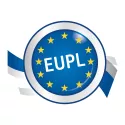
From March to December 2024 (and it may probably continue in 2025) the group « Write Free Software » has openly debated on the EUPL licence, producing one of the most interesting discussion on this specific topic.
It comes from “the world” (from EU and from US for a good part) but it's clear, independent, uncensored, without controversy and worth reading: here.
We note that one criticism concerns the name of the license: EUPL can lead one to believe that it is reserved to be used by licensors from the European Union (European citizens) and that it operates on the territory of the EU only. On this point, there is a communication effort to do: the licence is “originated” and promoted/supported by the European Commission, but anyone in the world can use it.
Referenced solution



Comments
The discussions around the EUPL license, especially within the “Write Free Software” group, highlight the growing importance of clarifying its scope and applicability. The concern regarding the name of the license is valid—many might indeed assume it’s exclusive to EU citizens or projects within the EU. However, as emphasized, the EUPL is global in reach, and this misunderstanding points to a need for better communication and awareness efforts.
It's worth noting that the EUPL’s design as a moderately "share-alike" license aligns well with fostering collaboration and reuse while protecting public interest. Given the increasing adoption of open-source solutions worldwide, clarifying such misconceptions is crucial to ensuring broader acceptance and use.
This resonates with broader themes in technology, such as those seen with AI tools like OpenAI’s ChatGPT, where transparency and accessibility are key to building trust and fostering adoption across diverse communities. The EUPL’s global applicability could follow a similar path, provided its benefits and openness are communicated effectively.